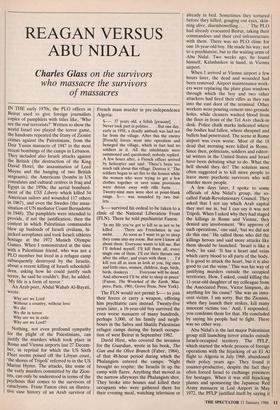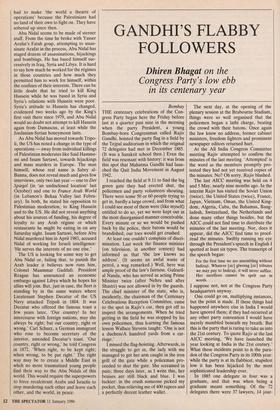REAGAN VERSUS ABU NIDAL
Charles Glass on the survivors
who massacre the survivors of massacres
IN THE early 1970s, the PLO offices in Beirut used to give foreign journalists copies of pamphlets with titles like, 'Who are the real terrorists?' Written to show the world Israel too played the terror game, the handouts repeated the litany of Zionist crimes against the Palestinians, from the Deir Yassin massacre of 1947 to the most recent bombings of the camps in Lebanon. They included also Israeli attacks against the British (the destruction of the King David Hotel, the assassination of Lord Moyne and the hanging of two British sergeants), the Americans (bombs in US consulates and cultural centres in Iraq and Egypt in the 1950s; the aerial bombard- ment of the USS Liberty which killed 34 American sailors and wounded 117 others in 1967), and even the Swedes (the assas- sination of UN mediator Count Bernadotte in 1948). The pamphlets were intended to provide, if not the justification, then the context in which Palestinian commandos blew up busloads of Israeli civilians, hi- jacked aeroplanes and took Israeli athletes hostage at the 1972 Munich Olympic Games. When I remonstrated at the time with a Palestinian friend, who was not a PLO member but lived in a refugee camp subsequently destroyed by the Israelis, about a recent killing of Israeli schoolchil- dren, asking how he could justify such terror, he said he couldn't. But, he added, `My life is a form of terror.'
An Arab poet, Abdul Wahab Al-Bayati, wrote: Why are we Lord Without a country, without love We die We die in terror Why are we in exile Why are we Lord?
Nothing, not even profound sympathy for the plight of the Palestinians, can justify the murders which took place in Rome and Vienna airports last 27 Decem- ber, in reprisal for which the US Sixth Fleet seems poised off the Libyan coast, `the shores of Tripoli' referred to in the US Marine Hymn. The attacks, like some of the early murders committed by the Zion- ists, can only be understood in terms of the psychosis that comes to the survivors of cataclysms. Franz Fanon cites an illustra- tive case history of an Arab survivor of French mass murder in pre-independence Algeria: S—. 37 years old, a fellah [peasant]. . . . Never took part in politics. . . . But one day, early in 1958, a deadly ambush was laid not far from the village. After this the enemy [French] forces went into operation and besieged the village, which in fact had no soldiers in it. All the inhabitants were summoned and questioned; nobody replied. A few hours after, a French officer arrived by helicopter and said: 'There's been too much talk about this village. Destroy it.' The soldiers began to set fire to the houses while the women who were trying to get a few clothes together or save some provisions were driven away with rifle butts. . . . Twenty-nine men were shot at point-blank range. S— was wounded by two bul- lets. . . .
5— survived his ordeal to be taken to a clinic of the National Liberation Front (FLN). There he told psychiatrist Fanon: `In my life you've got to kill so as not to be killed . . . . There are Frenchmen in our midst. . . . As soon as I want to go to sleep they come into my room. But now I know all about them. Everyone wants to kill me. But I'll defend myself. I'll kill them all, every single one of them. I'll cut their throats one after the other, and yours with them . . . I'd kill you all as soon as look at you, big ones and little ones, women, children, dogs, birds, birds, donkeys . . . . Everyone will be dead. And afterward I'll be able to sleep in peace' (Fanon, The Wretched of the Earth, Mas- pero, Paris, 1961; Grove Press, New York).
The FLN would not permit 5— to join their forces or carry a weapon, offering him psychiatric care instead. Twenty-five years later, a 16-year-old boy survived the even worse massacre of many hundreds, perhaps 3,000, of his family and neigh- bours in the Sabra and Shatila Palestinian refugee camps during the Israeli occupa- tion of west Beirut in September 1982.
David Hirst, who covered the invasion for the Guardian, wrote in his book, The Gun and the Olive Branch (Faber, 1984), of that 48-hour period during which the Phalangists entered the camps: 'Night brought no respite: the Israelis lit up the camp with flares. Anything that moved in the narrow alleyways the Phalangists shot. They broke into houses and killed their occupants who were gathered there for their evening meal, watching television or already in bed. Sometimes they tortured before they killed, gouging out eyes, skin- ning alive, disembowelling. . . .' The PLO had already evacuated Beirut, taking their commandoes and their civil infrastructure with them. There was no PLO clinic for one 16-year-old boy. He made his way, not to a psychiatrist, but to the waiting arms of Abu Nidal. Two weeks ago, he found himself, Kalashnikov in hand, in Vienna airport.
When I arrived at Vienna airport a few hours later, the dead and wounded had been removed. Airport maintenance work- ers were replacing the plate glass windows through which the boy and two other attackers had fired their rifles as they ran into the east door of the terminal. Other workers were pouring cement into grenade holes, while cleaners washed blood from the floor in front of the Tel Aviv check-in desk. Police chalk marks indicated where the bodies had fallen, where shrapnel and bullets had penetrated. The scene at Rome airport was even worse. Most of the 18 dead that morning were killed in Rome. Since then, politicians, soldiers and editor- ial writers in the United States and Israel have been debating what to do. What the hell should they do? The solution most often suggested is to kill more people to leave more psychotic survivors who will murder more people.
A few days later, I spoke to some officials of Abu Nidal's group, the so- called Fatah-Revolutionary Council. They asked that I not say which Arab capital they met me in, but I can say it was not Tripoli. When I asked why they had staged the killings in Rome and Vienna, they denied any involvement. 'We approve of such operations,' one said, 'but we did not do this one.' He called those who did the killings heroes and said more attacks like them should be launched. 'Israel is like a body,' he said. 'It has a heart and veins which carry blood to all parts of the body. It is good to attack the heart, but it is also good to cut the veins.' This was his way of justifying murders outside the occupied territories. How, I asked, could killing the 11-year-old daughter of my colleague from the Associated Press, Victor Simpson, do anything for his cause? 'She was an inno- cent victim. I am sorry. But the Zionists, when they launch their strikes, kill many innocent victims too.' And, I responded, you condemn them for that. He concluded by saying his people had to fight. There was no other way.
Abu Nidal's is the last major Palestinian group still launching terror attacks outside Israeli-occupied territory. The PFLP, which started the whole process of foreign operations with the hijacking of an El Al flight to Algeria in July 1968, abandoned their policy years ago. They found it counter-productive, despite the fact they often forced Israel to exchange prisoners for hostages. When it was still hijacking planes and sponsoring the Japanese Red Army massacre in Lod Airport in May 1972, the PFLP justified itself by saying it had to make 'the world a theatre of operations' because the Palestinians had no land of their own to fight on. They have sobered up since then.
Abu Nidal seems to be made of sterner stuff. From the time he broke with Yasser Arafat's Fatah goup, attempting to assas- sinate Arafat in the process, Abu Nidal has staged dozens of assassinations, hijackings and bombings. He has based himself suc- cessively in Iraq, Syria and Libya. It is hard to say how much he worked for the regimes in those countries and how much they permitted him to work for himself, within the confines of their interests. There can be little doubt that he tried to kill King Hussein while he was based in Syria and Syria's relations with Hussein were poor. Syria's attitude to Hussein has changed, evidenced two weeks ago by the King's first visit there since 1979, and Abu Nidal would no doubt not attempt to kill Hussein again from Damascus, at least while the Jordanian-Syrian honeymoon lasts.
As Abu Nidal has moved towards Tripo- li, the US has noted a change in the type of operations — away from individual killings of Palestinian moderates like Said Hamma- mi and Issam Sartawi, towards hijackings and mass murders in Europe. The man himself, whose real name is Sabry al- Banna, does not reveal much and gives few interviews, only two last year — one to Der Spiegel (in 'an undisclosed location' last October) and one to France Arab World (in Lebanon's Bekaa Valley last Febru- ary). In both, he stated his opposition to Palestinian moderation, to King Hussein and to the US. He did not reveal anything about his sources of funding, his degree of loyalty to any Arab regime or which restaurants he might be eating in on any Saturday night. Issam Sartawi, before Abu Nidal murdered him in April 1983, accused Nidal of working for Israeli intelligence: `He serves the interests of no one else.'
The US is looking for some way to get Abu Nidal or, failing that, to punish the Arab leader it believes now runs him, Colonel Muammar Gaddafi. President Reagan has announced an economic embargo against Libya which he hopes his allies will join. But, just in case, the fleet is standing by in the same waters where Lieutenant Stephen Decatur of the US Navy attacked Tripoli in 1804. It was Decatur who offered the famous toast a few years later, `Our country! In her intercourse with foreign nations, may she always be right; but our country, right or wrong.' Carl Schurz, a German immigrant who rose to become secretary of the interior, amended Decatur's toast. 'Our country, right or wrong,' he told Congress in 1872. 'When right, to be kept right; when wrong, to be put right.' The right way may be to create a Middle East in whch no more traumatised young people find their way to the Abu Nidals of this world. This would require the superpowers to force recalcitrant Arabs and Israelis to stop murdering each other and leave each other, and the world, in peace.



























































 Previous page
Previous page